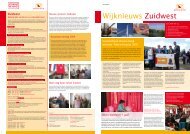freakonomics
freakonomics
freakonomics
You also want an ePaper? Increase the reach of your titles
YUMPU automatically turns print PDFs into web optimized ePapers that Google loves.
Elderly players, meanwhile, are victims of taste-based discrimination: in the early rounds<br />
and late rounds, they are eliminated far out of proportion to their skills. It seems as if the<br />
other contestants—this is a show on which the average age is thirty-four—simply don’t<br />
want the older players around.<br />
It’s quite possible that a typical Weakest Link contestant isn’t even cognizant of his<br />
discrimination toward Hispanics and the elderly (or, in the case of blacks and women, his<br />
lack of discrimination). He is bound to be nervous, after all, and excited, playing a fastmoving<br />
game under the glare of television lights. Which naturally suggest another<br />
question: how might that same person express his preferences—and reveal information<br />
about himself—in the privacy of his home?<br />
In a given year, some forty million Americans swap intimate truths about themselves<br />
with complete strangers. It all happens on Internet dating sites. Some of them, like<br />
Match.com, eHarmony.com, and Yahoo Singles, appeal to a broad audience. Others cater<br />
to more specific tastes: ChristianSingles.com, JDate.com, LatinMatcher.com,<br />
BlackSinglesConnection.com, CountryWesternSingles.com, USMilitarySingles.com,<br />
PlusSizeSingles.com, and Gay.com. Dating websites are the most successful<br />
subscription-based business on the Internet.<br />
Each site operates a bit differently, but the gist is this: You compose a personal ad about<br />
yourself that typically includes a photo, vital statistics, your income range, level of<br />
education, likes and dislikes, and so on. If the ad catches someone’s fancy, that someone<br />
will e-mail you and perhaps arrange a date. On many sites, you also specify your dating<br />
aims: “long-term relationship,” “a casual lover,” or “just looking.”<br />
So there are two massive layers of data to be mined here: the information that people<br />
include in their ads and the level of response gleaned by any particular ad. Each layer of<br />
the data can be asked its own question. In the case of the ads, how forthright (and honest)<br />
are people when it comes to sharing their personal information? And in the case of the<br />
responses, what kind of information in personal ads is considered the most (and least)<br />
desirable?<br />
Two economists and a psychologist recently banded together to address these questions.<br />
Ali Hortaçsu, Günter J. Hitsch, and Dan Ariely analyzed the data from one of the<br />
mainstream dating sites, focusing on roughly 30,000 users, half in Boston and half in San<br />
Diego. Fifty-seven percent of the users were men, and the median age range for all users<br />
was twenty-six to thirty-five. Although they represented an adequate racial mix to reach<br />
some conclusions about race, they were predominantly white.<br />
They were also a lot richer, taller, skinnier, and better-looking than average. That, at<br />
least, is what they wrote about themselves. More than 4 percent of the online daters<br />
claimed to earn more than $200,000 a year, whereas fewer than 1 percent of typical<br />
Internet users actually earn that much, suggesting that three of the four big earners were









